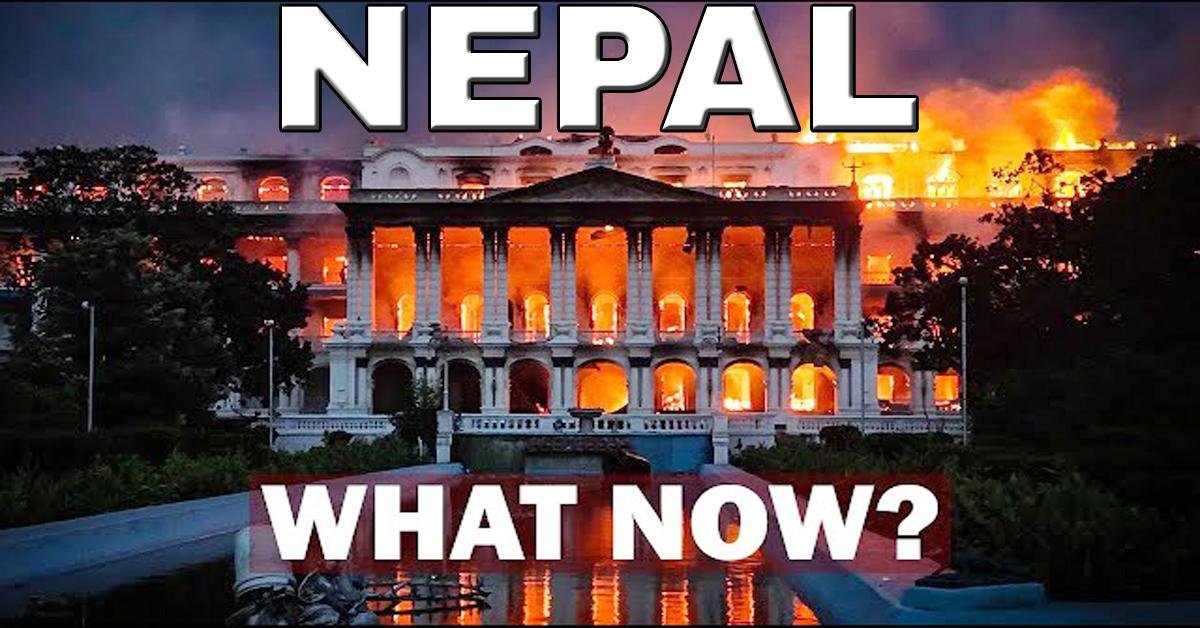Home Minister Ramesh Lekhak, who was facing criticism after the death of several people in protests against the ban on social media and alleged political corruption in Nepal’s capital Kathmandu, has resigned from his post. He submitted his resignation to Prime Minister KP Sharma Oli on Monday night. However, two ministers who were present in the meeting told BBC Nepali Service that the Prime Minister has not yet accepted his resignation
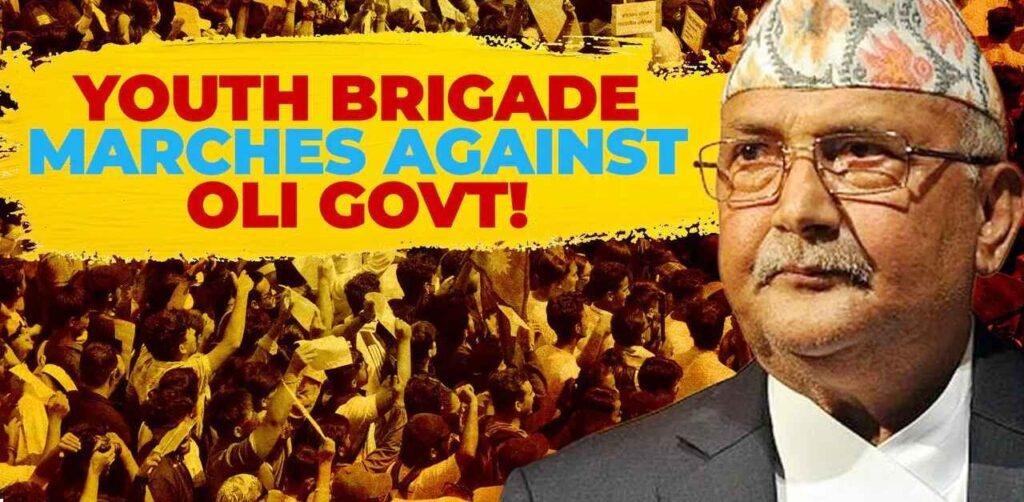
Large-scale protests are being held in Nepal against the social media ban and alleged corruption in the system. More than 12 people have died so far in the clashes between the youth and the police. More than 100 people have been injured and are being admitted to different hospitals. According to the BCC, some protesters were trying to enter the Parliament House premises by crossing the barricades. During this, there was a clash, and the police used force. Curfew was imposed in many places. Along with the police, they police are also on the road. Despite this, the protesters are firm on their demands. These protesters, who call themselves the new generation, are also raising the issue of alleged corruption prevalent in the system. However, in the meantime, Nepal’s Information Minister has given such indications that the decision to ban social media can be reconsidered. When and how did this protest start? In fact, the Nepalese government had banned 26 social media platforms last week. These include social media and messaging platforms like Facebook, Instagram, and WhatsApp. The government says that social media companies were given a week to follow the law of the country, open local offices, and appoint grievance officers. Chinese social media company TikTok complied with these conditions in time, so TikTok was not banned. A large number of people in Nepal live abroad. After being banned on messaging apps and social media, Nepali citizens living abroad are facing difficulties in contacting their families. After the ban on social media websites, the youth called for a protest. The Nepo Baby trend was also started on TikTok, in which pictures and videos of the luxurious lives of the children of leaders were posted. It raised the question that politicians are benefiting their children but not working for the country. This protest of the youth is being called the Jain Ji Protest, in which most of the youth are college students. The decision may be reconsidered. At the same time, Nepal’s Government Information Minister Prithvi Subah Guru has said that discussions are going on to reconsider the decision to ban social media. Prime Minister KP Sharma Oli had called a cabinet meeting on Monday. At the same time, late on Monday night, the Ministry of Information and Communication said that two social media platforms have been registered and the ban on them has been lifted. Officials said that two platforms, including one that was earlier Twitter, have contacted the Nepal Government for information about the registration process. argues that they are not banning social media but rather trying to bring social media platforms within the ambit of Nepali law
Nepal Gen Z Protest intensifies, resignation of many ministers, including PM, will the situation be like Bangladesh, Sri Lanka?
Nepal’s Prime Minister KP Sharma Oli resigned from his post on Tuesday afternoon. KP Sharma Oli was facing criticism after the death of many people in the ‘Gen Z’ protest in the capital Kathmandu over the ban on social media and alleged political corruption in Nepal. This demonstration of youth in Nepal is being compared to the demonstrations in Bangladesh last year and Sri Lanka before that. In India’s neighboring country, Nepal, Zen G is angry; their anger was seen on the road to the Parliament. This Jayanti Protest started over corruption in the government, and the social media turned violent, and many people even died.
The pictures of the protest from Nepal reminded me of the movement in Bangladesh last year, when the student movement took a violent turn, and then Sheikh Hasina, who was in power, had to leave both her government and the country. Earlier in the year 2022, people in Sri Lanka also protested against the government.
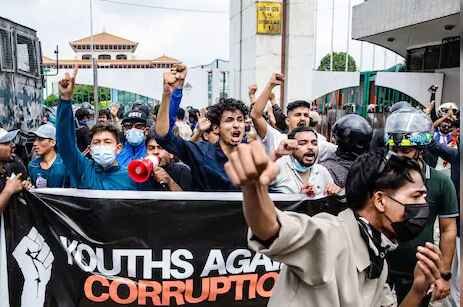
That is, in recent years, the youth in India’s neighboring countries shook the government with their anger, but can any similarity be seen in the movements of these three countries? Dhananjay Tripathi, an expert on the geopolitics of South Asia and Associate Professor at South Asian University, says that this area of South Asia is full of youth, and the government is not able to fulfill the expectations of these youth. This is the similarity in the movement of all three countries. Another crisis in Nepal is that after the end of the monarchy, no government has been able to complete a 5-year term; that is, political stability remains in the country, and corruption cases are also being raised. Last year, the role of youth was most important in the movement in Bangladesh, while economic issues dominated the movement in Sri Lanka. Professor Harsh Paint, Vice President of the Department of Studies and Foreign Policy, Delhi-based Observer Research Foundation, says that the reasons for the movement in these three countries, Sri Lanka, Bangladesh, and Nepal, may have been different, but they are not matching the expectations of the people. Youth is the biggest factor in these three movements. If the government does not try to calm the anger of the youth, then this movement can become bigger. Earlier in Bangladesh, the government had tried to deal with the agitators with force, but this increased the anger of the youth. The student movement that started against reservations in government jobs in Bangladesh turned into a nationwide protest.
The movement that started from universities and colleges reached every corner of the country, and the opposition parties also came out on the streets, and finally, the government of Sheikh Hasina fell. Talking about Sri Lanka, at the beginning of the year 2022, inflation in Sri Lanka increased rapidly, and the foreign exchange reserves were depleted. There was a shortage of fuel, food items, and medicines in the country. Many people held President Gotabaya Rajapaksa and his family responsible for these conditions.
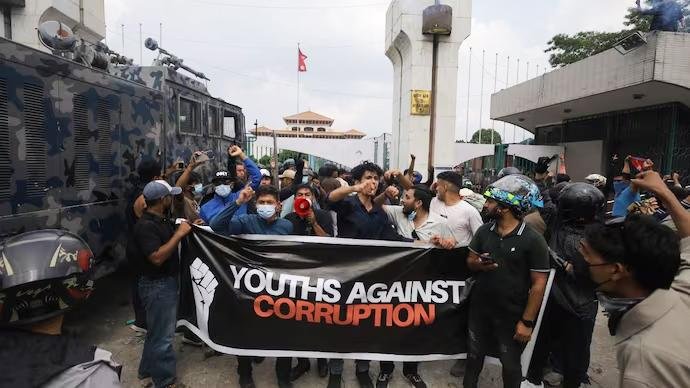
Rajapaksa. The family was also accused of corruption and misusing public money. However, he denied these allegations and argued that the crisis was caused by the fall in tourism after the COVID pandemic and the rise in oil prices due to the Ukraine war. But the anger of the common people did not stop us. Then, from students to priests and Buddhist monks, everyone joined the protest. The slogan of Gotta Go Home was raised across the country. The movement reached its zenith when the protesters entered the Rashtrapati Bhavan a few weeks later. Gotabaya Rajapaksa fled the country a few days later and submitted his resignation from Singapore. The incident was seen as a victory of the people’s struggle.
Balen Shah is being discussed in Nepal. Is Nepal going to get new leadership?
Many ministers, including Prime Minister KP Sharma Oli, resigned amid the protests. At present, there is no Prime Minister in Nepal. In such a situation, the question is what can happen next in Nepal’s politics. Any leader can get command of Nepal, but the big question is whether a new leader will be born there. Nepal’s Oli government had to surrender completely in one and a half days of protest. Even the protesters attacked and beat up Nepal’s ministers. Before this, more than a dozen youths were killed in Monday’s protest. The name of Kathmandu Mayor Balan Shah is leading. Protesters are asking Balan Shah to lead on social media. Can Balan Shah emerge as an alternative in Nepal? How do Nepal analysts see Balan Shah? Nepal’s well-known CK Lal says that if we look at Jalan’s performance in Ukraine, populist leaders come from such movements, but the problem with them is that there is no organization, and neither is there any ideology.

Many times, the leadership that is born by coming in front of the crowd is not free from danger to expect much change from it. People from Kathmandu, Mayor Balan Shah. There are appeals on social media to resign and lead. Whenever there is talk of alternative politics in Nepal, the name of Balin Shah often comes up in discussion. Why are people trusting Balin Shah so much? Sike Lal says that people see Balin Shah as an attractive personality. He is a singer. His work does not show any special impact. It is just that he speaks against the government, like Balin Shah had said that he would set fire to the Singh Darbar. No responsible leader can speak like this, but he has no problem speaking like this. Such language and such a personality attract the troubled crowd. Many people are comparing Balin Shah with Arvind Kejriwal, but Vijaykant Karan, who was Nepal’s ambassador to Denmark, does not agree with this. Vijaykant Karna says that Balin Shah has no political background, whereas Arvind Kejriwal had a social life and worked in NGOs. On the other hand, Balin Shah was on the path. The biggest thing is that this movement has no leader. CK Lal says that a movement without leadership is like flood water and makes its own path. Will the Jain Ji movement be able to make its way in Nepal? In response to the question, CK Lal says that there is no possibility of Jain ji’s anger getting any direction. There is also a fear in such a movement. Some cunning people use it and become leaders. Is there disappointment with the communist parties? CK Lal told BBC Hindi that Holi’s tendency has been that opposition is not tolerated. There is nothing new in this. You remember that in 2015, in the Madhes movement, similar mass murders took place, but Madhes’ issues do not come up in Kathmandu’s media. Holi has become a part of the rule, and they feel that no one can do any harm. Communist parties have been in power since the end of the monarchy in Nepal in 2008. In such a situation, the question arises whether the hangover of the end of the monarchy in Nepal has now gone away. Do the people of Nepal now want a new option? CK Lal answers this by saying, See, public memories do not last long. Secondly, the new generation is here. They do not even have experience with a monarchy. They will compare. Those who protested against that kurta are good, if we talk about it, then they were youngsters till the age of 25, they have seen Prachand Holi and Deoband eating together in power, there is nothing else, on the other hand, those who are in power feel that they have come after making a lot of sacrifices, so if they do anything, the public will forgive them. Still, I think there are problems on both sides.
Inside story of Sushila Karki becoming Nepal’s PM: Delegation of 16 Gen Z, what is the whereabouts; Why did Balen Shah do this
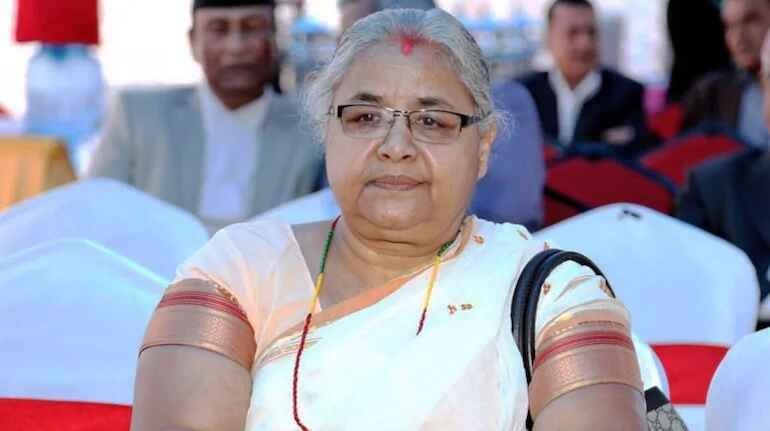
After the pro-government protests, violence, and coup, Nepal has its next Prime Minister. Sushila Karki became the first woman Prime Minister of the country. She took the oath of her office, and now a kind of provisional government has been formed in Nepal, but no minister has been appointed. All the departments will be with Sushila Karki. There was a consensus on the name of Sheila Karki, while Kathmandu Mayor Daya Shah had the full support of the agency. Her role was discussed with the General Secretary of Nepal, who included two Prime Ministerial candidates. Three days later, Karki became the Prime Minister. In 2 days, she had to take responsibility of the Prime Minister’s subject in the military headquarters. The biggest thing is that she started her career from the ruling party in the year 1979. She was the female Chief Justice of Nepal from 11 July 2016 to 6 June 2017. He was impeached in 2017, involving high-profile cases, but Nepal’s political power is opposing the whole process. The decision has been taken and how to bring Nepal back to power again
Gen-Z brought down governments of 3 countries in 4 years: PM chosen on social media in Nepal; How the generation with 8 seconds of focus is changing the world
It is often said about this generation that it is not in their power to focus on more than art. This generation of internet and smartphones is lazy and confused, but this generation G, that is, children born between 1997 and 2012, toppled the governments of three countries in 4 years. The latest case is of Nepal, where the agency’s revolution was such that one night and the night itself was toppled. For the first time in the world, its Prime Minister was chosen on social media. Today in Monday Mega, let us first know the story of Jayanti and her exploits. How the agency is challenging governments around the world. In France, the Block Everything protest is going on against the 2026 budget, which is being led by the agency, and causing sabotage. In the year 2021, the agency had revolted against the army rule in Myanmar. In return, they were tortured, arrested, and some were even killed. But for the last 4 years, the youth have been continuously trying to end the army rule and have started protests against it to attract the whole world towards their demands. The youth of Thailand used social media. Apart from this, whether it was the protest against the coronavirus in India or the protest against handing over Hong Kong’s land to China, or the protest against electoral rigging in Belarus, no one was left behind. After the struggle of life, let us now look at those countries where the anger of the agency changed the government. The government of Nepal blocked more than 20 social media platforms, including Facebook and YouTube. Soon, the protest started against the social media ban and corruption. To stop them, the police fired tear gas shells and rubber bullets.
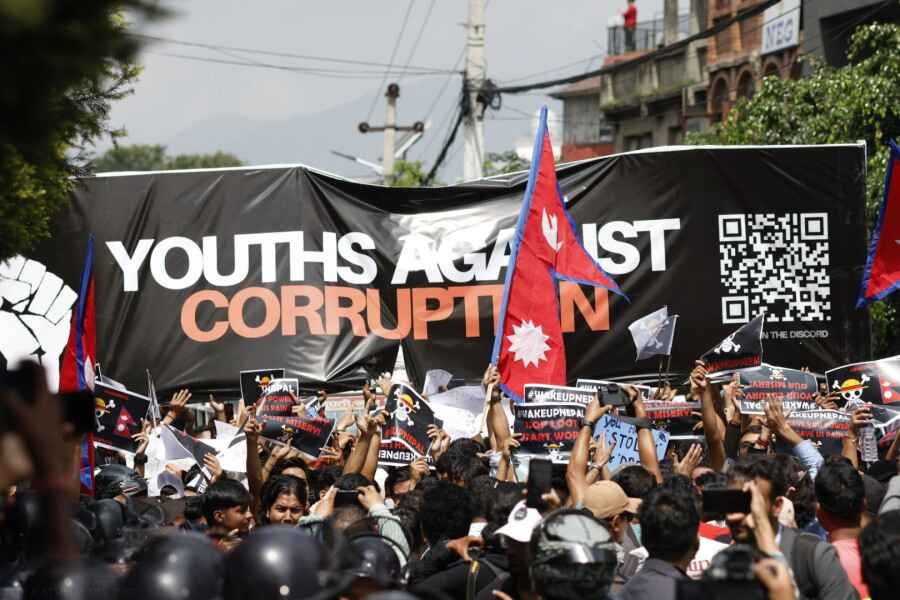
Thousands were injured, and 19 died in the conflict. The protest became more fierce the next day. PM KP Sharma Oli had to resign and run away. Former Prime Minister Sher Bahadur Deuba and former Finance Minister Vishnu Prasad Pavdel were chased and thrown into many government buildings. After the fall of the government, Nepal’s Janji elected their new PM, Sushila, by voting on the social media platform Discord. After the purpose was accomplished, the agencies there also got busy in making the country clean. Last year, the High Court in Bangladesh raised the issue of the 30% quota system in government jobs. Ordered to implement it again, started a revolution in protest On July 20, the police tried to stop this revolution About 560 people lost their lives There was no violence Finally, on August 5, Prime Minister Sheikh Hasina had to resign and take refuge in India With the consent of youth organizations, an interim government was formed by appointing Nobel Peace Prize winner Mohammad Yunus as the chief advisor In the year 2022, the Rajapaksa family in Sri Lanka was accused of corruption by taking loans from abroad. There the problem of food shortage, poverty, power cuts, inflation started increasing Protests against it intensified in March, in which a large number of Janjis participated Social media was used to spread the fire of protest The government made the protest on social media and it became fierce On 9th, PM Mahendra Rajapaksa suppressed the President On July 14, Rajapaksa resigned through email Elections were held again in the country and Anurag Disha Nayak was elected President Now let us understand who are the people who are creating such a revolution They have been using internet, smartphone and technology since its inception, that is why they are also called digital natives 99% of the people have smartphones 94% agency social media but they tell time and 57% use AI Nearly 45% of consumers can hardly manage their monthly expenses 61% are struggling with financial anxiety This generation is growing up in the era of costly loans and uncertain jobs Social media is their main weapon of protest According to Deloitte, even if the agency gets higher salary, but if it is less boring, they will not work There are many challenges in front of this video too After corona epidemic, one out of every two people feels depression According to the study, being connected to technology all the time, excessive screen time has a bad effect on health They are definitely adept in digital communication, but they have problem in talking face to face They are also worried about not having money
